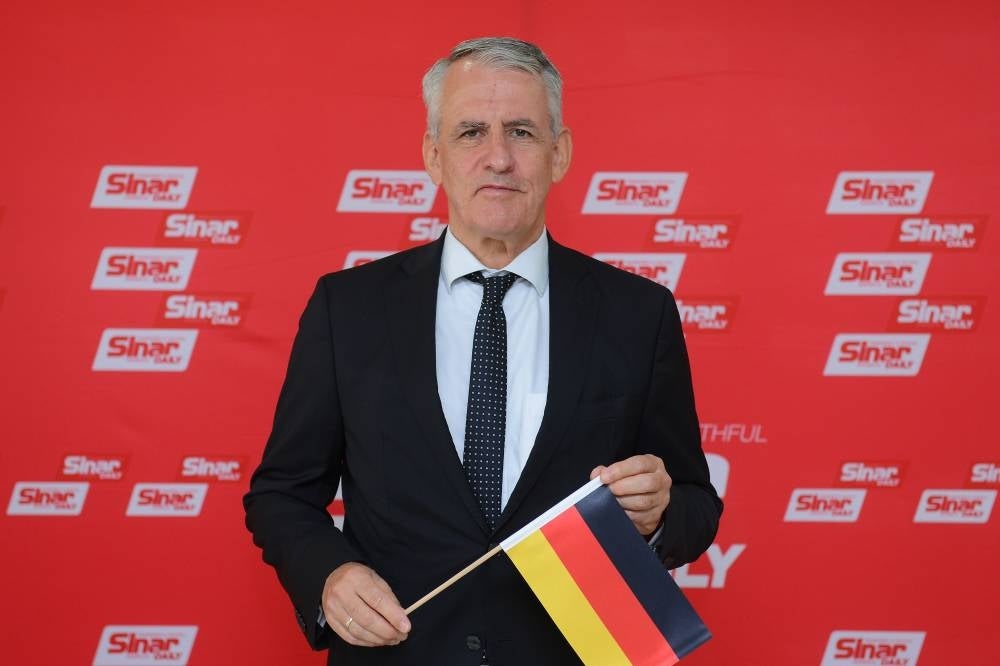Global challenges: Pandemic, war and climate change

SHAH ALAM – The pandemic, Russia’s war of aggression against Ukraine and climate change are the three global challenges in the multipolar world.
German Ambassador to Malaysia Dr Peter Blomeyer said the pandemic had caused a major setback in the economic sectors worldwide, which saw how it separates the poor and the rich, which applies to people and states.
He said that we could only survive global challenges together and not at the expense of one another and this was seen as vaccines were developed and exported to other countries.
“European Union (EU) had developed the vaccines and half of it went into export,” he said in his keynote address at the Wacana English Edition’s dialogue titled 'Global Challenges in a Multipolar World' organised by Sinar Daily at Karangkraf headquarters here.
As we were stepping out of the shadow of the pandemic, hoping to concentrate on overcoming its economic and social adversity, another global challenge emerged – the war of aggression in Ukraine.
Dr Blomeyer said unlike the pandemic, the war was a manmade catastrophe for the Ukrainian victims and it was an essential blow to our international law and the United Nations (UN) system.
“Tens of thousands dead, even more wounded, and among them were children traumatised with too many deprived of their lives and their parents,” he said.
The men and women in Ukraine had to give up their normal lives to fight for their country, ready to pay the highest price – their lives.
This does not include the destruction of cities, infrastructure, and cultural heritage in the country.
“141 states including Malaysia and seven other Asean member states have condemned Russia’s war of aggression and Russia has been excluded from the human rights council but they are still on the security council,” he said.
The war had caused a grave threat to food security worldwide as Ukraine was one of the largest exporters of wheat and other food essentials.
Dr Blomeyer said it had also launched the world into depreciation with the inflation rate skyrocketing, a repercussion faced around the globe. This can be seen with the leap in food and oil prices globally.
“How is the multipolar world reacting towards this, who are the actors in the multipolar world? The five permanent members of the UN council? Countries with possession of nuclear weapons, the nations with the highest gross domestic product (GDP)? Multinational corporation? International non-governmental organisation? How do these criteria relate to the global challenges?” he questioned.
Another global challenge faced all over the world, Dr Blomeyer said, was climate change which had the potential of devastating our planet and making it inhabitable.
“Climate change is not just coming, but it is already here.
“We have increasingly heavy rains with landslides, we have droughts and heatwaves like in India now.
“We have a change of weather pattern, and we have the six big waves of extinction of species much faster than the previous month,” he added.
Dr Blomeyer said the environment could be destroyed irreparably by continued industrialisation, population growth and unabetted exploitation of our natural resources.
He said that Germany aimed to be carbon neutral by 2045 while Europe and Malaysia by 2050 but by the look of the rising emissions, we are unlikely doing enough to reverse the climate change.
People believe that the fight in climate change was too costly, and this mindset needed to be changed.
In combatting the global challenges, Dr Blomeyer said that our starting point should be the nature of the challenge. For climate change and pandemic, it was a global threat to mankind and it was a challenge for everyone on earth to tackle.
This was different as compared to manmade challenge in Russia-Ukraine war.
He said although most nations have condemned the act, not all feel affected by it.
“Some believed it is far away and not their business, some want to preserve their neutrality, some think that there need to be a balance between the multipolar systems, some think that it is not so much about Ukraine but the power struggle between the United States (US) and Russia or North Atlantic Treaty Organisation (Nato) and Russia,” he said.
Dr Blomeyer added some sided with Russia because they considered the US or the West an enemy of Islam due to the interventions made in Afghan, Iraq and Libya or their stance in the Pakistan conflict.
This attitude, he said, ignore not only the different positions of Western countries in the conflicts but also the dreadful war that Russia itself has the lead against Islamic populations.
“These views are saddening, it is a step backward into the era of imperialism and before where every state had the right to withdraw against another state and only the warfare was subjected to certain rules to avoid war crime
“Today, the war of aggression clearly is not allowed, so our starting points should be to say what is right and wrong where the points of reference should be the international law,” he said.
He added that the challenge of our time is that we withstand dictators in any country abusing its power and imposing their will on others by force, be it in Europe, Asia or elsewhere.
Russian’s act of aggression should not be allowed to be a precedent, said Dr Blomeyer, adding that countries with superpowers and nuclear powers must respect the rights of their neighbours.
Only then, when we find the strength to join and rally behind the banner of the law, will we succeed.
Russia had launched a full-scale military invasion into Ukraine on February 24, 2022, which saw thousands of civilians dead, and internally displaced more than seven million people.
The conflict had forced another five million Ukrainians to flee to neighbouring countries—the majority of whom have arrived in Poland, a NATO country where the United States and other allies are helping to accommodate the influx of refugees, the UN said.The Wacana English Edition was held in collaboration with Eu in conjunction with Europe Day today.
Aside from Dr Blomeyer, 15 other EU ambassadors to Malaysia also attended the dialogue which include EU Ambassador Michalis Rokas, Hungary Ambassador Dr Petra Ponevacs-Pana and Poland Ambassador Krzysztof Debnicki.
Also in attendance were Karangkraf Group Chairman Datuk Hussamuddin Yaacub, Karangkraf Group Executive Director Akmal Eirfan Mohamed Fauzi, Sinar Karangkraf Chief Executive Officer Farah Hussamuddin and Sinar Karangkraf Editor-in-Chief Rozaid Rahman.













